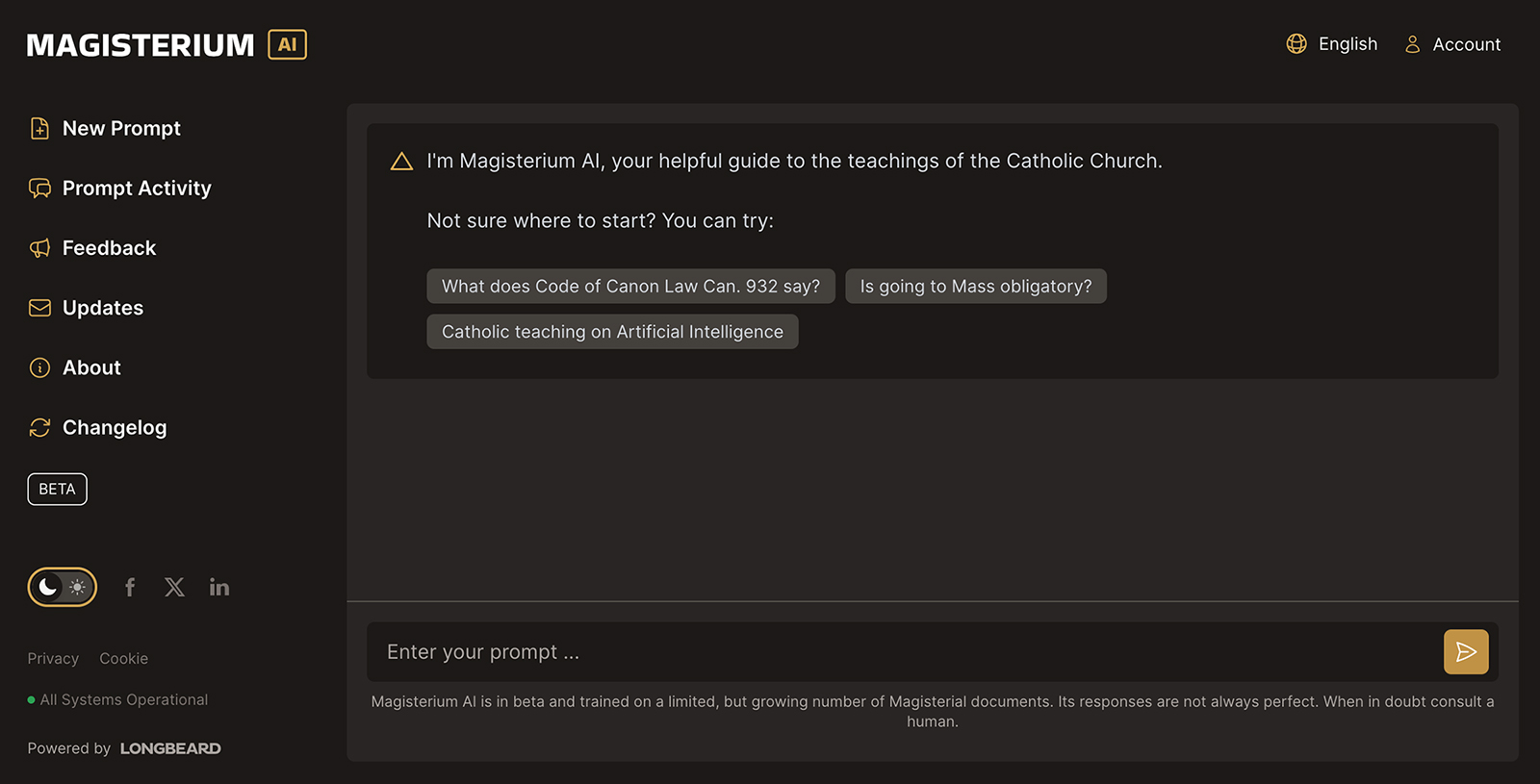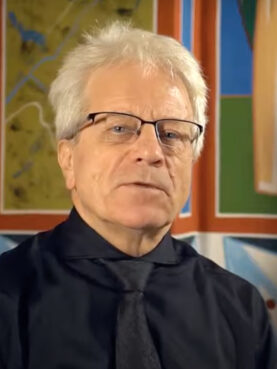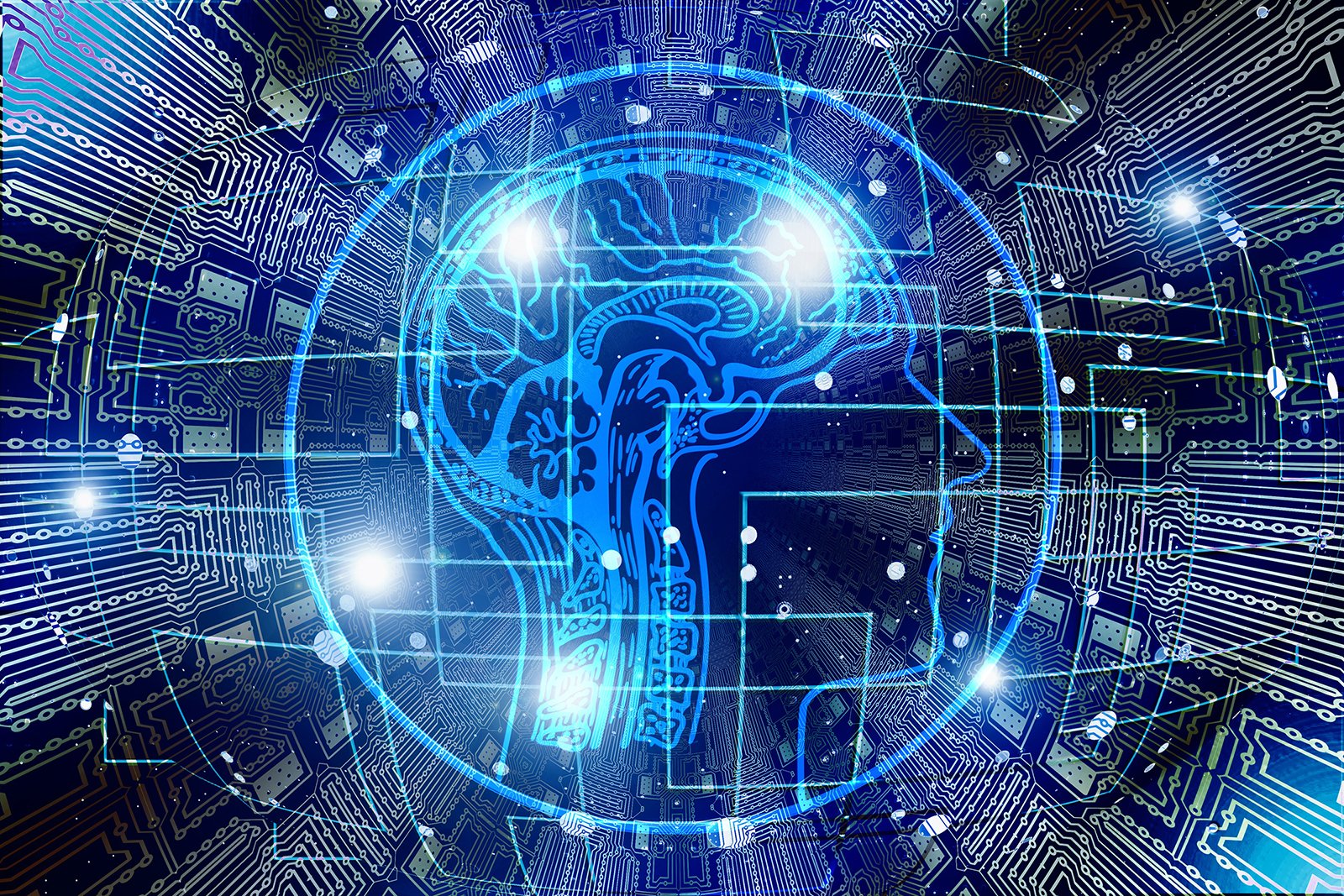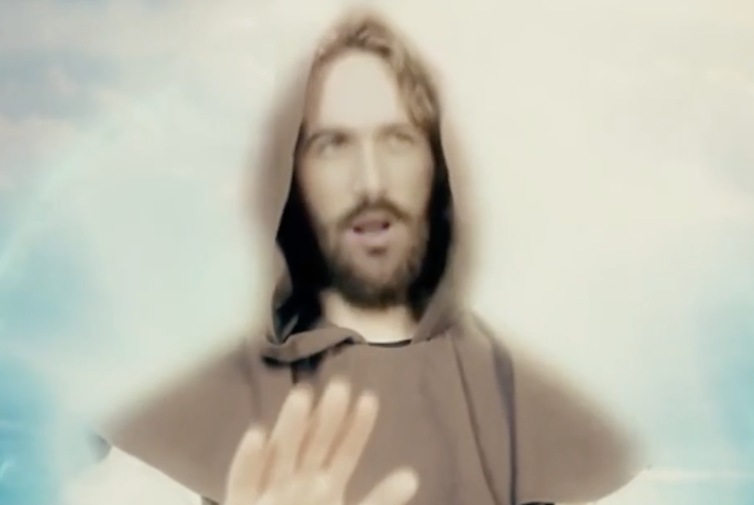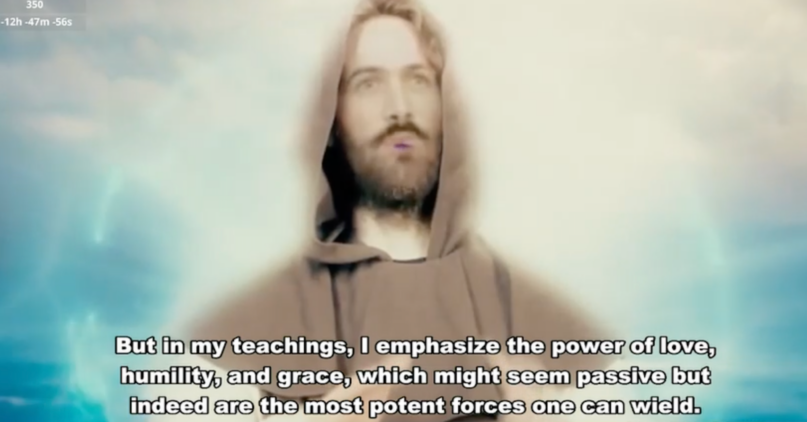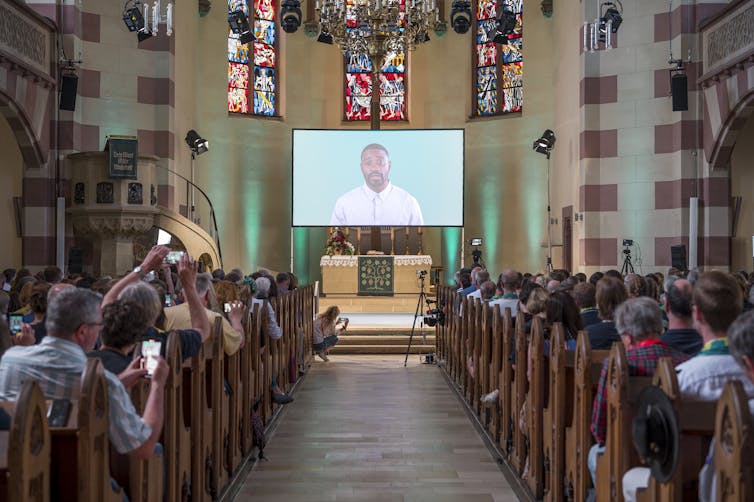PROFANE SANCTITY
The radical, irreverent and inclusive religion of Burning Man
'Perhaps our presence can give people the sense that religion doesn’t need to be as judgmental or scary or exclusionary as they might experience it,' said John Brett, who helps lead the Religious AF camp at Burning Man.
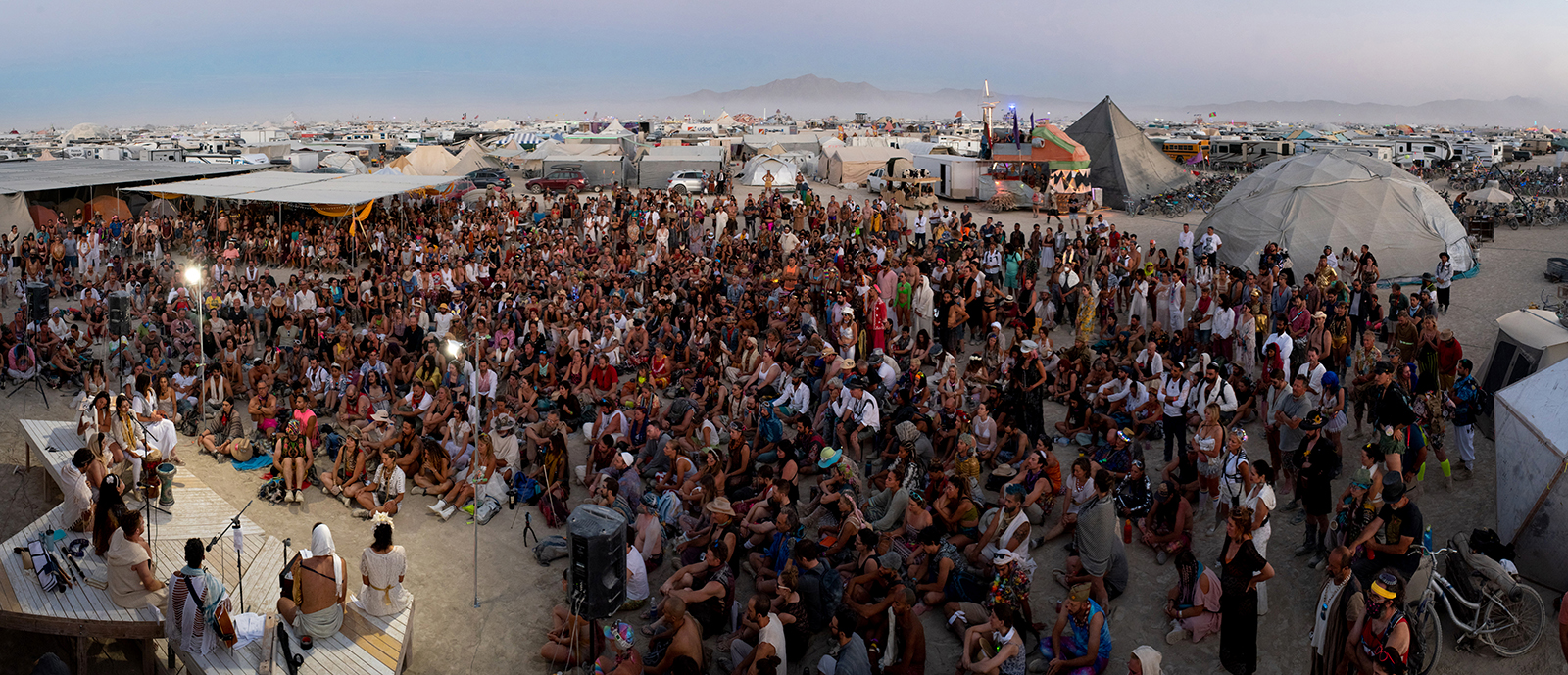
Milk + Honey Shabbat service and dinner during Burning Man at the Milk + Honey camp in Black Rock City, Nevada, on Friday, Sep 2, 2022. Photo © Marlena Sloss
(RNS) — Zvika Krieger never intended to go to rabbinical school. But each time he led the Burning Man Shabbat service, alongside hundreds of glittery, sweaty “burners,” dozens would line up to thank him. For some, it was their first religious service in decades.
“After doing this for so many years, I started thinking, this is the pinnacle of my year,” said Krieger, who left his role last year as a director at Facebook’s parent organization, Meta, to lead a Jewish spiritual community in Berkeley, California. “I feel like I’m really helping to nourish people who are not getting served elsewhere.”
Burning Man, the annual anarchic gathering in the salt flats of Black Rock Desert in northwestern Nevada and scheduled for Aug. 27 – Sept. 4, is often acclaimed for its hedonism and famed for its drug-taking and public nudity. But the event has always had its spiritual side: 10 guiding principles, a nondenominational temple and recurring burning rituals. And in recent years, religious groups have been carving out their own space on “the playa” — Burning Man’s public square — offering judgement-free, radically inclusive rituals that seem to grow more popular each year.
Fourteen years ago, Milk + Honey, a Burning Man camp founded by Jewish members, hosted a 30-person Shabbat that has since ballooned to include 1,000 participants. Each year, the sea of attendees dressed in colorful attire enjoys traditional songs and prayers interwoven with secular music selections. Krieger’s sermon usually incorporates both references to the week’s Torah reading and to Burning Man’s orgy dome, and the service concludes with a massive Shabbat dinner, with wine and challah bread aplenty.

Zvika Krieger, center right with microphone, speaks during the Milk + Honey camp Shabbat service during Burning Man in Black Rock City, Nevada, on Friday, Sep 2, 2022. Photo © Marlena Sloss
“Shabbat literally means to pause,” said Krieger. “So it’s an opportunity to press pause on the craziness of Burning Man, that 80,000-person thumping energy of the playa, and take a breath, relax, turn inward, reflect, feel nourished, feel connected and in community.”
Milk + Honey’s offerings are both sacred and profane. There’s the “bubby oracle,” a person dressed as a grandma who offers insights and postcards for writing to one’s grandmother. At the “Rituals R Us” pop-up, burners spin a wheel for their chance at scoring an impromptu (and unofficial) wedding, funeral, baptism, bat mitzvah or circumcision.
Another ritual is honored at a brunch where hot dogs take the place of lox. “We’re serving a bagel brunch, with all the fixings, and also hot dogs,” Krieger explained. “But if you want to have a hot dog, you have to get the hot dog circumcised. You have to snip the tip and put the tip in the tip jar.”

Milk + Honey camp Shabbat dinner at Burning Man in Black Rock City, Nevada, on Friday, Sep 2, 2022. Photo © Marlena Sloss
Mainline Protestantism has its own spiritual space in the Religious As F–k camp, founded by a group of Episcopalians. This year the group of 15-25 campers, mostly from Mainline denominations, will offer morning devotions called “For Christ’s Sake!,” talks on Jesus and psychedelics and “coffee and confession.”
“We will offer them absolution and their morning caffeine,” quipped John Brett, a chaplain in San Francisco’s night ministry serving queer folks and the unhoused community.
One of the highlights of the week for Brett is the group’s Ash Wednesday service, held at the nondenominational temple. Since Burning Man operates on its own clock, or the lack of one, Religious AF members don’t mind that its service comes months after Ash Wednesday on the church calendar, when Christians reflect on mortality.
Gathered beneath the wooden beams of the temple, where burners grieve, contemplate and leave offerings, Brett and other group members take ashes from the previous year’s burns and impose them on the foreheads of all who wish to participate.

Religious AF camp members and visitors hold an Ash Wednesday service at the Temple during Burning Man 2019 in Black Rock City, Nevada. Photo by Alex Leach
“Those who experienced religious trauma and spiritual abuse, who found their way to Burning Man and are on their own journey of meaning making, some discover us unaware that Christians might show up on the playa. Many fall into tears in our arms,” said Brett. “Perhaps our presence can give people the sense that religion doesn’t need to be as judgmental or scary or exclusionary as they might experience it in what burners call the ‘default world.’”
For Gabriel Serafini, founder of the Healing Footwash camp, negotiating if or how to bring religion to Burning Man took years. The Footwash camp was started by a group of Christian Scientists who brought a makeshift Christian Science reading room to the desert where they hosted Christian Science lectures. But soon after Serafini, who was raised in Christian Science, got involved in 2013, he suggested offering foot washings instead, to emulate Jesus’ act of service to his disciples in the New Testament.

Burners stop at the Healing Footwash camp during Burning Man in Black Rock City, Nevada. Photo courtesy Healing Footwash
The first year, the group lugged folding chairs, 55-gallon water barrels and a giant 60-by-40-foot cruciform tent into the desert, washing about 30-40 people’s feet in all. Almost a decade later, Serafini estimated that with the help of other burners, they washed the feet of between 1,000-2,000 people.
Though the group still hosts Wednesday testimony services with readings from Christian Science founder Mary Baker Eddy’s “Science and Health,” they now see the foot washing less as a religious service and more as an act of peacemaking.
“It doesn’t matter what your religious practices are, or if you believe in God. When somebody gives this as a gift, it’s special, it’s out of the ordinary,” said Serafini. “And it’s something that leads to an almost instant connection.”
According to David DeSteno, a professor of psychology at Northeastern University in Boston whose podcast “How God Works” explored the spirituality of Burning Man, religious groups’ radical acceptance could be one reason for their success at Burning Man.

Religious AF camp offers Communion during Burning Man 2022 in Black Rock City, Nevada. Photo by Alex Leach
“The people who are leaving religion, as we’re seeing in all the surveys out there, most of them aren’t becoming atheists,” said DeSteno. “They’re looking for new ways to be spiritual because the current institutions don’t speak to them anymore.”
DeSteno added that Burning Man has been shown to have transformational effects. In a 2022 study of 1,200 attendees of “secular” mass gatherings, including Burning Man, 63.2% reported being at least somewhat transformed by the experience, involving feelings of increased connection with something larger than oneself. In the weeks and months after an event, having a transformative experience was positively associated with generosity.
Though the study doesn’t explain why these transformations happen, DeSteno suggested it could be Burning Man’s creation of a liminal space where burners rely on each other to survive a harsh environment, like a kind of rite of passage.
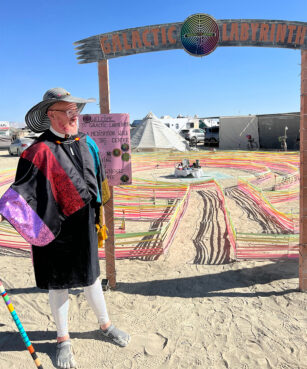
John Brett at Burning Man 2022 in Black Rock City, Nevada. Photo by Annie Dunlap
“I think it’s those elements of intense experiences that we don’t get much in modern experiences of faith anymore, but that can really move people emotionally,” said DeSteno. “It creates a ritualistic environment where we really can shed our identity, take on new names and new clothes and be free to have our identity reshaped and understand our interdependence.”
For both Brett and Krieger, the religious nature of the rituals they offer are just one part of Burning Man’s spiritual landscape. Brett compared Burning Man to a pilgrimage — a place where global travelers gather for a divine encounter. For Krieger, whose faith is grounded in Jewish mysticism, God is everywhere at Burning Man: on the dance floor, under the stars, among the towering art pieces.
“To me, the real divinity of the event is about the space where people can be open hearted, where they can connect to others and be their true authentic selves, they can be vulnerable, and they can have these transformations,” said Krieger. “The whole event itself feels spiritual to me.”

